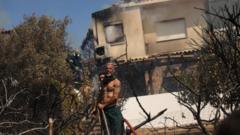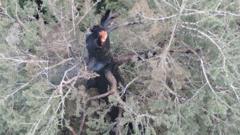The wildfire erupted in low vegetation around Palaia Fokaia and Thymari, approximately 40 km (25 miles) southeast of Athens, rapidly advancing into populated areas and prompting mass evacuations. Local officials reported that at least 20 homes were lost to the flames, with many others suffering significant damage. The extreme heat, with temperatures reaching as high as 40°C, combined with strong winds made firefighting efforts particularly difficult.
In response to the emergency, local residents rapidly joined forces with firefighters, forest rangers, and aerial support to combat the flames and protect their properties. The coast guard was also dispatched along the coastline, while emergency alerts were issued through Greece’s 112 system, advising numerous towns and villages to evacuate.
Greece's commitment to bolstering its wildfire response has seen an increase in firefighting personnel this year, with additional 18,000 firefighters and volunteers deployed for the season, which is set to continue until October. Earlier fire incidents on Chios, Greece’s fifth-largest island, have also raised alarms about the growing prevalence of wildfires in the region.
Witness accounts from Thymari highlighted the urgency, as one resident returned to find her home already engulfed in flames due to the relentless winds. The advancing fire also threatened the coastal road leading towards Cape Sounion, leading authorities to evacuate over 1,000 individuals from danger zones.
In some instances, locals resisted evacuation orders, attempting to fend off the flames with garden hoses, which officials cautioned could endanger lives and hinder emergency response efforts. Reports indicated that at least 40 people, including vulnerable individuals such as children and the elderly, were rescued by police after being trapped as the fire spread.
Specialized firefighting teams remained engaged in intense operations, battling the blaze both on land and in the air to safeguard areas in proximity to residential structures. Local deputies expressed the dire situation in surrounding villages, emphasizing their efforts to provide shelter and medical care to those affected.
The head of Greece's fire service has instigated an arson investigation unit to determine if the wildfire was started intentionally. Forecasts from Greece's Risk Assessment Committee signal continued elevated temperatures and a high risk of wildfires across Attica, Evia, the Peloponnese, and the northern Aegean in the days ahead.
In response to the emergency, local residents rapidly joined forces with firefighters, forest rangers, and aerial support to combat the flames and protect their properties. The coast guard was also dispatched along the coastline, while emergency alerts were issued through Greece’s 112 system, advising numerous towns and villages to evacuate.
Greece's commitment to bolstering its wildfire response has seen an increase in firefighting personnel this year, with additional 18,000 firefighters and volunteers deployed for the season, which is set to continue until October. Earlier fire incidents on Chios, Greece’s fifth-largest island, have also raised alarms about the growing prevalence of wildfires in the region.
Witness accounts from Thymari highlighted the urgency, as one resident returned to find her home already engulfed in flames due to the relentless winds. The advancing fire also threatened the coastal road leading towards Cape Sounion, leading authorities to evacuate over 1,000 individuals from danger zones.
In some instances, locals resisted evacuation orders, attempting to fend off the flames with garden hoses, which officials cautioned could endanger lives and hinder emergency response efforts. Reports indicated that at least 40 people, including vulnerable individuals such as children and the elderly, were rescued by police after being trapped as the fire spread.
Specialized firefighting teams remained engaged in intense operations, battling the blaze both on land and in the air to safeguard areas in proximity to residential structures. Local deputies expressed the dire situation in surrounding villages, emphasizing their efforts to provide shelter and medical care to those affected.
The head of Greece's fire service has instigated an arson investigation unit to determine if the wildfire was started intentionally. Forecasts from Greece's Risk Assessment Committee signal continued elevated temperatures and a high risk of wildfires across Attica, Evia, the Peloponnese, and the northern Aegean in the days ahead.



















